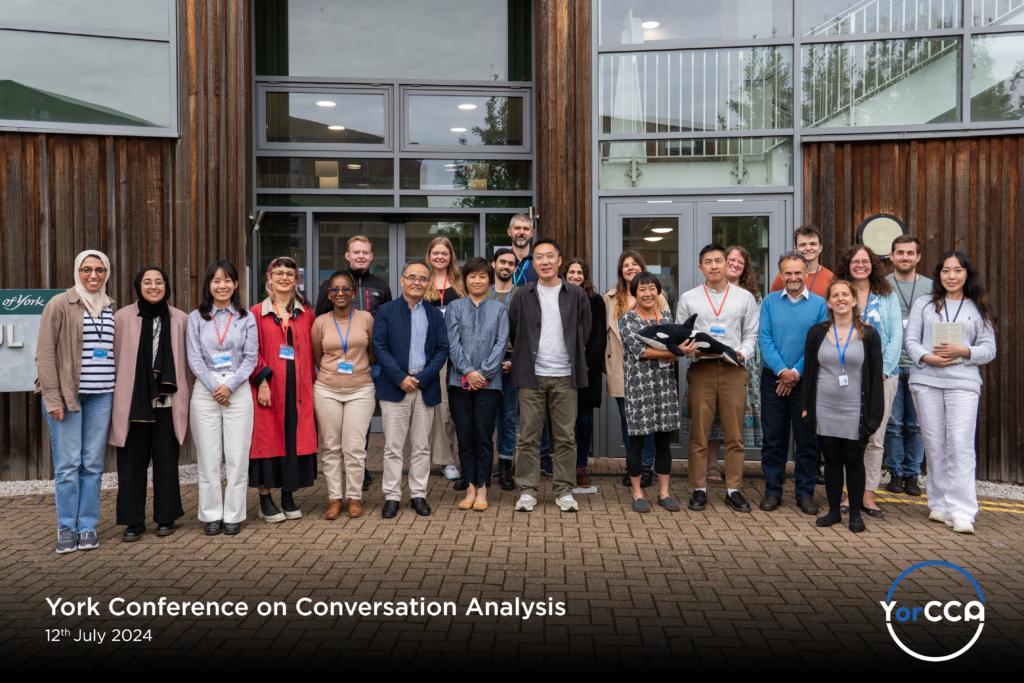Yuhan Jiang, Teachers College, Columbia University, USA
The York Conference on Conversation Analysis (YorCCA 2024) took place on July 12th, 2024 in York, UK. The conference was a CA conference organized by postgraduate researchers at the University of York, in collaboration with the Centre for Advanced Studies in Language and Communication (CASLC). The primary goal of the conference was to create a supportive environment where postgraduate researchers could present their work to peers and experienced academics, receiving valuable feedback and guidance as they progress with their projects.
YorCCA 2024 featured a small yet rich program, including two invited lectures, eight project presentations by graduate researchers from universities in the UK, Europe, the US, and China, as well as three digital poster presentations. The hybrid conference welcomed participants both in-person at the University of York and virtually via Zoom from all over the world.
The conference started with an inspiring lecture on the topic of “Discovering a Candidate Phenomenon” by one of the invited speakers, Dr. Rebecca Clift from University of Essex. Dr. Clift briefly introduced the nature of observation in CA and ways of developing observation of a candidate observation into a discovery. She referenced a wealth of literature and illustrated them with multiple intriguing examples. She also emphasized that “[Discovery in CA] is not about confirming literature, but about collecting your own data and finding context from the literature”, encouraging researchers to question the literature and build their own findings from existing studies.
Dr. Clift’s lecture served as a perfect starting point of the conference, which was followed by eight fascinating presentations of eight individual CA projects:
- “Coming home: The hello summons-answer sequence in family interaction” by Nicole Smith from University of Essex
- “The use of turn-initial fe as disjunctive marker in Suzhounese conversation” by Yuhan Jiang from Columbia University
- “Parental embodies corrections while dealing with ‘non-compliant behaviour’ in family interaction” by Sinem Köklü from Université Lumière Lyon 2
- “Development trajectories of parce que (‘because’), en fait (‘in fact’) and tu sais (‘you know’) in L2 French: A comparison” by Melissa Julliett from University of Neuchâtel
- “Setting limits on questions in news interviews” by Matthew Butler from University of York
- “Let’s stay calm! Does anybody know how to do manual compression? Does anybody know how to stop the haemorrhage?: Providing medical assistance in emergency calls” by Ana Sofia Meneses-Silva from University of Porto (online)
- “The discussion of common mental health concerns using conversation analysis and co-creation methods” by Iris van der Scheer from University College London
- “Mouth opening sequences in dental appointments: A collaborative interplay” by Kleopatra Sideridou from Newcastle University
The presentations covered a wide range of contexts and disciplines — from medical, academic settings to household interactions — and multiple languages, such as English, French, and Chinese. Some projects explored embodied behaviors (e.g., mouth opening) in conversation and discovered innovative phenomena, all of which echoed with the essence of Dr. Clift’s opening lecture. The Q&A sessions after each presentation marked the highlight of the conference, where researchers discussed and addressed questions from the audience, providing a playground for researchers to engage in thoughtful discussions, share unique insights, and help presenters further refine their projects.
The conference concluded with a compelling talk by Dr. Elliot Hoey from Vrije Universiteit Amsterdam. He presented his research on “The organization of openings in police videographer interactions”, featuring rich video data that showcased the action of “cop-watching” and explored how interaction between police videographers and the police unfolded.
Overall, YorCCA 2024 successfully brought together scholars in the field of CA and reignited their passion for CA. It offered researchers an invaluable opportunity to learn from each other and seek potential future collaborations.

Group photo at the conference
